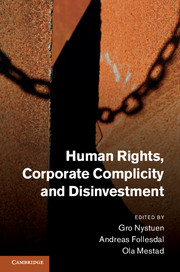Book contents
- Frontmatter
- Contents
- Note on the contributors
- Referenced case law
- Acknowledgements
- 1 Introduction
- 2 Disinvestment on the basis of corporate contribution to human rights violations: the case of the Norwegian Government Pension Fund
- 3 Laws, standards or voluntary guidelines?
- 4 Responsibility beyond the law?
- 5 Attribution of responsibility to listed companies
- 6 Responsibility for human rights violations, acts or omissions, within the ‘sphere of influence’ of companies
- 7 Human rights investment filters: a defence
- 8 The moral responsibilities of shareholders: a conceptual map
- 9 Sovereign wealth funds and (un)ethical investment: using ‘due diligence’ to avoid contributing to human rights violations committed by companies in the investment portfolio
- 10 Corporations and criminal complicity
- Appendices
- Bibliography
- Index
- References
7 - Human rights investment filters: a defence
Published online by Cambridge University Press: 07 October 2011
- Frontmatter
- Contents
- Note on the contributors
- Referenced case law
- Acknowledgements
- 1 Introduction
- 2 Disinvestment on the basis of corporate contribution to human rights violations: the case of the Norwegian Government Pension Fund
- 3 Laws, standards or voluntary guidelines?
- 4 Responsibility beyond the law?
- 5 Attribution of responsibility to listed companies
- 6 Responsibility for human rights violations, acts or omissions, within the ‘sphere of influence’ of companies
- 7 Human rights investment filters: a defence
- 8 The moral responsibilities of shareholders: a conceptual map
- 9 Sovereign wealth funds and (un)ethical investment: using ‘due diligence’ to avoid contributing to human rights violations committed by companies in the investment portfolio
- 10 Corporations and criminal complicity
- Appendices
- Bibliography
- Index
- References
Summary
… to gain money we must not lose our souls … We are … to gain all we can without hurting our neighbour.
John Wesley, ‘On the Use of Money’Introduction
Do investors have an obligation to not invest in corporations that contribute to human rights violations? – even when such divestment neither causes changes in the corporations, nor prevents the violations? These questions go to the heart of what over the last forty years has become known as ‘Socially Responsible Investing’ (SRI).
This name may be new, but both divestment and such worries about the practice are old. Appeals to divest from multinational corporations go back to the seventeenth century, against one of the earliest forms of economic globalization: the international slave trade. The present reflections address questions that have accompanied SRI since this very first case. Is there a justification of divestment that holds up even in the face of general breaches of the norms? Can such a justification avoid reliance on controversial religious views? And are there any grounds to believe that such divestment may be effective against human rights violations, even in the absence of a powerful hegemon that sanctions violations of the norms?
- Type
- Chapter
- Information
- Human Rights, Corporate Complicity and Disinvestment , pp. 132 - 155Publisher: Cambridge University PressPrint publication year: 2011



